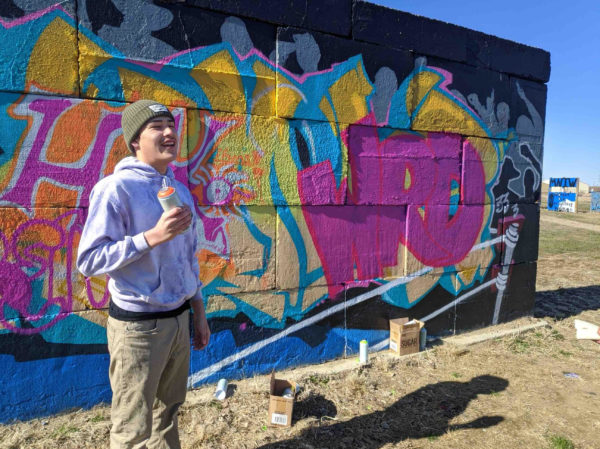
- Details
- By Native News Online Staff
EAGLE BUTTE, S.D. — The Cheyenne River Youth Project (CRYP) has seen a lot of ups and downs in its nearly 32-year history, including the Great Recession of 2008. Now it’s facing what might be its biggest challenge yet: the COVID-19 pandemic.
Yet this grassroots nonprofit organization, serving the youth on the Cheyenne River Sioux Reservation, is meeting that challenge head-on. CRYP is continuing to offer modified internship programming throughout the outbreak and has also devised new, creative ways to continue serving its tribal community.
“Right now, we’re continuing to welcome our teen interns to Cokata Wiconi (Center of Life) for education and instruction,” said Julie Garreau, CRYP’s executive director. “Our cohorts are less than 10 kids each, and we have plenty of space, so we can adhere to social distancing guidelines while providing key pieces of our internship training. We also follow rigorous hygiene protocols to ensure the safety of our staff and our young people.”
The Native Wellness interns are currently in the middle of their program, while the art interns have completed theirs. CRYP staff already is recruiting to fill the spring Indigenous Cooking Internship Program and Art Internship Program; each program has room for six teen interns.
“Not all of our kids are safer at home, unfortunately,” Garreau said. “They rely on us to be there for them, and that’s more important than ever during a public health emergency.
“They’ve lost school, they’ve lost after-school activities, they’ve lost part-time jobs and access to positive role models—they need us. And, to be honest, we need them! So, we are willing to do whatever it takes to keep our doors open in some fashion.”
The youth project’s staff members share Garreau’s dedication, and they employ impressive resourcefulness on a daily basis as they devise new approaches to programming. One of those staff members is Tyler Read, CRYP’s art director.
“We’re absolutely dedicated to serving our youth against all odds, trials, and tribulations,” he said. “We do this in a variety of ways. My role is to help them explore their creativity through art; as I read through our kids’ journal entries, I see how critical this is right now, with all the chaos and uncertainty around us. Our kids need something to help reduce stress and anxiety, take them out of survival mode, and put them into a place where they can reconnect with their creative spirit so they don’t burn out.”
The teens have indeed been forthcoming in their journal entries, sharing thoughts such as, “The internship made me forget that I’m alone,” “I love it here, because I have a little bit of purpose to my life,” “I never really thought one little drawing could have so much meaning,” and “Being here felt great; seeing everyone and interacting was wonderful.”
Read also advised that he is researching additional options to help support his art interns, noting that CRYP needs to be prepared for what the future holds.
Social enterprises are still bustling at the youth project, as well. Shoppers may purchase a variety of gift items through the Keya Gift Shop online store at lakotayouth.org/shop, with proceeds benefiting CRYP directly.
The community may purchase takeout meals through the on-site Keya Cafe & Coffee Shop. And, as summer weather approaches, CRYP will begin food service through its Turtle Island Food Truck.
“We’re so grateful to our staff members, who are working incredibly hard every day to serve meals, provide internship instruction and safe learning spaces, maintain our facilities without volunteer support, and so much more,” Garreau said. “We’re also thankful to the partners and individuals across the country who are providing their support in so many ways. Together, we’ll get through this, and come out on the other side stronger and more resilient than ever.”
More Stories Like This
Native News Weekly (August 25, 2024): D.C. BriefsUS Presidents in Their Own Words Concerning American Indians
Native News Weekly (December 14, 2025): D.C. Briefs
Wounded Knee Massacre Site Protection Bill Passes Congress
Two Murdered on Colville Indian Reservation
Help us defend tribal sovereignty.
At Native News Online, our mission is rooted in telling the stories that strengthen sovereignty and uplift Indigenous voices — not just at year’s end, but every single day.
Because of your generosity last year, we were able to keep our reporters on the ground in tribal communities, at national gatherings and in the halls of Congress — covering the issues that matter most to Indian Country: sovereignty, culture, education, health and economic opportunity.
That support sustained us through a tough year in 2025. Now, as we look to the year ahead, we need your help right now to ensure warrior journalism remains strong — reporting that defends tribal sovereignty, amplifies Native truth, and holds power accountable.
 The stakes couldn't be higher. Your support keeps Native voices heard, Native stories told and Native sovereignty defended.
The stakes couldn't be higher. Your support keeps Native voices heard, Native stories told and Native sovereignty defended.
Stand with Warrior Journalism today.
Levi Rickert (Potawatomi), Editor & Publisher

